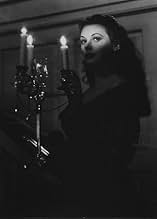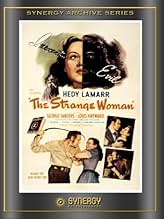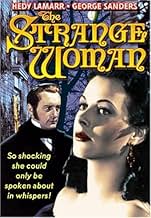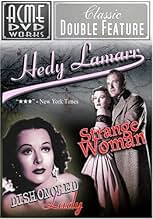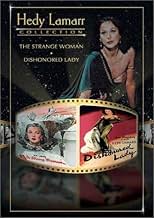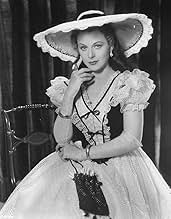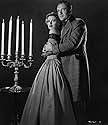PUNTUACIÓN EN IMDb
6,5/10
2,7 mil
TU PUNTUACIÓN
En la Nueva Inglaterra de 1820, Jenny Hager, una bella, pobre y manipuladora joven, se casa con el rico Isaiah Poster, y seduce a su hijo y al capataz de la empresa.En la Nueva Inglaterra de 1820, Jenny Hager, una bella, pobre y manipuladora joven, se casa con el rico Isaiah Poster, y seduce a su hijo y al capataz de la empresa.En la Nueva Inglaterra de 1820, Jenny Hager, una bella, pobre y manipuladora joven, se casa con el rico Isaiah Poster, y seduce a su hijo y al capataz de la empresa.
- Dirección
- Guión
- Reparto principal
Ed Agresti
- Congregation Member
- (sin acreditar)
John Alban
- Congregation Member
- (sin acreditar)
Fred Aldrich
- Sailor in Saloon
- (sin acreditar)
Jessie Arnold
- Mrs. Thatcher
- (sin acreditar)
Frank Baker
- Congregation Member
- (sin acreditar)
Edward Biby
- Mr. Partridge
- (sin acreditar)
Reseñas destacadas
Hedy Lamarr and Egar G. Ulmer. OK. It really did happen, improbable as the pairing seems.
She is very convincing as the daughter of a drunk who wants to dominate men and the society that squashed her when she was a child. It seems to me that her father speaks with a Scottish burr and that she does very briefly. The story might better have been changed so that he was an immigrant whose accent would be more consistent with th4e luscious Ms. Lamarr's own.
Nevertheless, it is atmospheric and very troubling. She marries an older man and immediately starts out in pursuit of his son. She gets the son and throws him over (a bit improbably) for Gweorge Sanders, wearing mutton chop sideburns here.
It's not Ulmer'best -- that might be his "Hamlet"pdate "Strange Illusion." But it is very good and it is one of the best performances ever given by Ms. Lamarr.
She is very convincing as the daughter of a drunk who wants to dominate men and the society that squashed her when she was a child. It seems to me that her father speaks with a Scottish burr and that she does very briefly. The story might better have been changed so that he was an immigrant whose accent would be more consistent with th4e luscious Ms. Lamarr's own.
Nevertheless, it is atmospheric and very troubling. She marries an older man and immediately starts out in pursuit of his son. She gets the son and throws him over (a bit improbably) for Gweorge Sanders, wearing mutton chop sideburns here.
It's not Ulmer'best -- that might be his "Hamlet"pdate "Strange Illusion." But it is very good and it is one of the best performances ever given by Ms. Lamarr.
Made just after Hedy had departed MGM when she was still a top star and able to pursue roles with more depth than the glamour assignments handed her by Metro. She was one of the producers of this outing and selected Ulmer as director. Theirs was a contentious partnership but the result was one of Hedy's best performances.
If you can put aside the fact that the lead character has a Viennese accent and her father an Irish one when they are both lifelong natives of Bangor, Maine then there is much to enjoy. Hedy, stunningly beautiful as always, plays a deeply conflicted woman well and though the film veers wildly from morality tale to lurid melodrama it is certainly more fun than a lot of more highly thought of films.
If you can put aside the fact that the lead character has a Viennese accent and her father an Irish one when they are both lifelong natives of Bangor, Maine then there is much to enjoy. Hedy, stunningly beautiful as always, plays a deeply conflicted woman well and though the film veers wildly from morality tale to lurid melodrama it is certainly more fun than a lot of more highly thought of films.
An obscure film which, because of surprising creative touches in directing, acting and editing, should be shown more often: more than a potboiler, more than a "women's picture" that did not happen to star Bette Davis or Joan Crawford, it offers an engaging story, characters of substance and - except for a convenient and contrived ending - an honest portrayal of people caught in a web of circumstances and emotions they cannot control. Aside from the glitter and sweep, it has more similarities to than differences from "Gone With the Wind."
This may be Hedy Lamarr's most challenging role, and she acquits herself quite well. George Sanders appears infrequently as a sympathetic character, but even he is victimized by the Scarlett O'Hara-like wiles of Hedy. That both of these performers have accents that are not suggestive of born-and-bred Maine residents should not constitute more than a minor annoyance. The picture has more than enough offsetting merits.
This may be Hedy Lamarr's most challenging role, and she acquits herself quite well. George Sanders appears infrequently as a sympathetic character, but even he is victimized by the Scarlett O'Hara-like wiles of Hedy. That both of these performers have accents that are not suggestive of born-and-bred Maine residents should not constitute more than a minor annoyance. The picture has more than enough offsetting merits.
For a generation hooked on special effects, and mostly shoddy updates of very old film cliches, 'Strange Woman' must seem like a very dated movie. Of course, that largely depends on generational film tastes. A good story; good if sometimes uneven performances, and of course Hedy Lamarr; one of Hollywood's best kept secrets. Poor Hedy usually got the short end of the stick, as most of the critical acclaim went to very over-rated actresses, who were not nearly as beautiful as Hedy. Critics could never get past her phenomenal beauty, and more often rewarded Bergman, Turner, Davis, and Crawford, because they looked like ordinary everyday people. Oh! the simple minded, one-dimensional critics who imposed their bland tastes on a public, that just craved good entertainment. Hedy as Jenny Hager represents a daring stretch for Hedy; and she delivers a somewhat hammy, but nevertheless engaging performance. George Sanders is excellent as usual, in one of his lesser roles, and the cinematography is first rate. This is a melodramatic melodrama folks! It represents a bygone era in movie-making; when movies were made to entertain, sometimes most effectively in black and white, very often with modest budgets, and without mindboggling effects, extremely loud soundtracks. This movie deserves a 7/10.
The Strange Woman is directed by Edgar G. Ulmer who also co-writes the screenplay with Hunt Stromberg and Herb Matthews from the novel of the same name written by Ben Ames Williams. It stars Hedy Lamarr, George Sanders, Louis Hayward, Gene Lockhart, Hilary Brooke, Rhys Williams and June Storey. Music is by Carmen Dragon and cinematography by Lucien N. Andriot.
I don't want the youngest. I want the richest!
Well well, what an intriguing little period noir this is. Story deals with Jenny Hagar (Lamarr), a strong and scheming woman who in 1840s Bangor in Maine, uses men for her own gains whilst exuding a double persona that shunts her into the upper echelons of the town's standings. But, as we become privy to Jenny's back story and psychological make-up, you can feel that cloud of pessimism closing in.
There will always be arguments put forward about if the likes of The Strange Woman should be classed as noir or not, but with Ulmer and Andriot cloaking the tale with claustrophobic shadows and low lights, the blacks and whites atmospherically used, thus the visuals are in place to marry up with the story, and what a story.
Jenny Hagar is a classic femme fatale, in fact fatalistic could be her middle name. We get a sneak peak of her deviousness as a child, and then we see her as a luscious older beauty, dangling men around her fingers and fully committed to marrying purely for money. What follows Jenny around is murder, suicide, incest, seduction, greed, violence and alcoholism! And of course, self-destruction.
Jenny has no qualms about who she tramples on to achieve her ends, but the kicker in her story is that she does have good in her fighting to get out, she can be charitable at times, and as we come to understand her upbringing she even garners a level of sympathy from the audience. It's this dual aspect of her make-up that intrigues greatly, but she's fighting a losing battle, more so as Bangor is the wrong place for her, itself a confused mess of unsavoury or spoilt characters.
There were problems behind the scenes, but so many conflicting reports exist it's hard to know what is true and who was pulling the main strings. What we do know is that Ulmer, armed with a bigger budget than usual, has crafted a moody and daring picture that strikes devilish notes without banging the drum too loudly. Striking scenes and imagery are many, thunderstorm seduction, lairy lumberjacks, river of death and the big finale are just some of the moments showing what Ulmer was capable off.
While Lamarr, for her pet project to move her into darker roles and be taken seriously as an actress, turns in a top performance. Unafraid of the material, she cuts loose with a blend of sexual dynamism and troubled soul. Around her are fine performances from Lockhart, Hayward and Brooke, though Sanders is a touch out of place. The pace sometimes sags, and motivations and actions of support characters could have been more fleshy, but in the main this is well worth taking a stroll down a dark alley for. 7.5/10
I don't want the youngest. I want the richest!
Well well, what an intriguing little period noir this is. Story deals with Jenny Hagar (Lamarr), a strong and scheming woman who in 1840s Bangor in Maine, uses men for her own gains whilst exuding a double persona that shunts her into the upper echelons of the town's standings. But, as we become privy to Jenny's back story and psychological make-up, you can feel that cloud of pessimism closing in.
There will always be arguments put forward about if the likes of The Strange Woman should be classed as noir or not, but with Ulmer and Andriot cloaking the tale with claustrophobic shadows and low lights, the blacks and whites atmospherically used, thus the visuals are in place to marry up with the story, and what a story.
Jenny Hagar is a classic femme fatale, in fact fatalistic could be her middle name. We get a sneak peak of her deviousness as a child, and then we see her as a luscious older beauty, dangling men around her fingers and fully committed to marrying purely for money. What follows Jenny around is murder, suicide, incest, seduction, greed, violence and alcoholism! And of course, self-destruction.
Jenny has no qualms about who she tramples on to achieve her ends, but the kicker in her story is that she does have good in her fighting to get out, she can be charitable at times, and as we come to understand her upbringing she even garners a level of sympathy from the audience. It's this dual aspect of her make-up that intrigues greatly, but she's fighting a losing battle, more so as Bangor is the wrong place for her, itself a confused mess of unsavoury or spoilt characters.
There were problems behind the scenes, but so many conflicting reports exist it's hard to know what is true and who was pulling the main strings. What we do know is that Ulmer, armed with a bigger budget than usual, has crafted a moody and daring picture that strikes devilish notes without banging the drum too loudly. Striking scenes and imagery are many, thunderstorm seduction, lairy lumberjacks, river of death and the big finale are just some of the moments showing what Ulmer was capable off.
While Lamarr, for her pet project to move her into darker roles and be taken seriously as an actress, turns in a top performance. Unafraid of the material, she cuts loose with a blend of sexual dynamism and troubled soul. Around her are fine performances from Lockhart, Hayward and Brooke, though Sanders is a touch out of place. The pace sometimes sags, and motivations and actions of support characters could have been more fleshy, but in the main this is well worth taking a stroll down a dark alley for. 7.5/10
¿Sabías que...?
- CuriosidadesExecutive producer Hunt Stromberg declared his dissatisfaction with the original opening sequence of Edgar G. Ulmer's own daughter Arianne Ulmer who played the young Jenny - she was purportedly not nasty enough - and so he and Hedy Lamarr enlisted Douglas Sirk to re-shoot the scenes using Jo Ann Marlowe who had appeared in Sirk's own Escándalo en París (1946) earlier that year, and who had also featured as Joan Crawford's daughter Kay in Michael Curtiz' Alma en suplicio (1945).
- PifiasEphraim paints "Nöel" rather than the correct "Noël."
- Citas
Lena Tempest: Honey, listen, with your looks you don't have to worry. You can get the youngest and best-looking man on the pier.
Jenny Hager: I don't want the youngest. I want the richest.
- Versiones alternativasLa extraña mujer (1946). Restoration Produced by Jeff Joseph/SabuCat. Digital scan by Film & Video Transfer, Chatsworth, CA. Cineaste Restoration - Thad Komorowski.. Final Conforming & Cleanup by The Finishing Touch. The Strange Woman (Restored Version) copyright 2020 Jeff Joseph/SabuCat.
- ConexionesFeatured in Edgar G. Ulmer: The Man Off-Screen (2004)
- Banda sonoraWhat Can You Do with a Drunken Sailor?
Traditional
Early 19th Century sea chanty
[Heard in tavern]
Selecciones populares
Inicia sesión para calificar y añadir a tu lista para recibir recomendaciones personalizadas
- How long is The Strange Woman?Con tecnología de Alexa
Detalles
- Fecha de lanzamiento
- País de origen
- Sitios oficiales
- Idioma
- Títulos en diferentes países
- Flor de insidia
- Localizaciones del rodaje
- Empresas productoras
- Ver más compañías en los créditos en IMDbPro
- Duración
- 1h 40min(100 min)
- Color
- Relación de aspecto
- 1.37 : 1
Contribuir a esta página
Sugerir un cambio o añadir el contenido que falta

